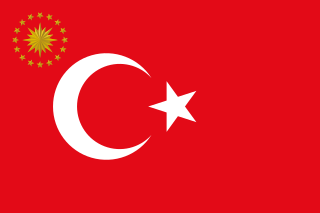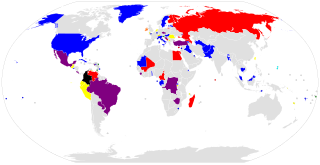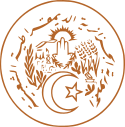
The president of Turkey officially the president of the Republic of Turkey, is the head of state and head of government of the Republic of Turkey. The president directs the executive branch of the national government and is the commander-in-chief of the Turkish military. The president also heads the National Security Council.

The Fifth Republic is France's current republican system of government. It was established 4 October 1958 by Charles de Gaulle under the Constitution of the Fifth Republic. The Fifth Republic emerged from the collapse of the Fourth Republic, replacing the former parliamentary republic with a semi-presidential system that split powers between a president as head of state and a prime minister as head of government. De Gaulle, who was the first French president elected under the Fifth Republic in December 1958, believed in a strong head of state, which he described as embodying l'esprit de la nation.

A referendum to approve the Évian Accords ending the Algerian War and granting self-determination to Algeria was held in France on 8 April 1962. It was approved by 90.8% of voters with a 75.3% turnout.

The Constitution of Australia is a written constitution that is supreme law in Australia. It establishes Australia as a federation under a constitutional monarchy and outlines the structure and powers of the Australian government's three constituent parts, the executive, legislature, and judiciary.
This national electoral calendar for the year 2010 lists the national/federal direct elections held in 2010 in all sovereign states and their dependent territories. Referendums are included, even though they are not elections. By-elections are not included.

This national electoral calendar for 2012 lists the national/federal direct elections that were held in 2012 in all sovereign states and their dependent territories. By-elections are excluded, though national referendums are included.

This national electoral calendar for 2014 lists the national/federal direct elections that were held in 2014 in all sovereign states and their dependent territories. By-elections are excluded, though national referendums are included.
This local electoral calendar for 2014 lists the subnational elections held in 2014. Referendums, retention elections, and national by-elections are also included.

This national electoral calendar for 2017 lists the national/federal direct elections that were held in 2017 in all sovereign states and their dependent territories. By-elections are excluded, though national referendums are included.
The Algerian Constitution of 1996 was passed in a referendum in 1996. It is the fundamental law of Algeria. The constitution was amended in 2002, 2008 and 2016.
This local electoral calendar for 2016 lists the subnational elections held in 2016. Referendums, retention elections, and national by-elections are also included.

This national electoral calendar for 2018 lists the national/federal direct elections that were held in 2018 in all sovereign states and their dependent territories. By-elections are excluded, though national referendums are included.

Abdelmadjid Tebboune is an Algerian politician currently serving as the President of Algeria since December 2019 and as Minister of Defence. He took over the power from former President Abdelaziz Bouteflika and former Acting Head of State Abdelkader Bensalah. Previously, he was Prime Minister of Algeria from May 2017 to August 2017. In addition, he was also Minister of Housing from 2001 to 2002 for a year and again from 2012 to 2017 for 5 years.
This local electoral calendar for 2018 lists the subnational elections held in 2018. Referendums, retention elections, and national by-elections are also included.

This national electoral calendar for 2019 lists the national/federal direct elections that were held in 2019 in all sovereign states and their dependent territories. By-elections are excluded, though national referendums are included.

This national electoral calendar for 2020 lists the national/federal direct elections that were held in 2020 in all sovereign states and their dependent territories. By-elections are excluded, though national referendums are included.
This local electoral calendar for 2020 lists the subnational elections held in 2020. Referendums, recall and retention elections, and national by-elections are also included.

Snap parliamentary elections were held in Algeria on 12 June 2021 to elect all 407 members of the People's National Assembly. Initially expected for 2022, the elections were held early in the context of a constitutional amendment propagated by a referendum in November 2020.

The 2020 Algerian constitutional referendum was held on 1 November 2020. The subject of the referendum was a revision of the Algerian constitution, and it follows a series of protests known as Hirak.

The Constitutional Council of Algeria was an Algerian judicial body from 1963 to November 2021.












